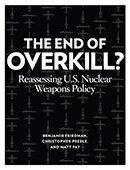President Obama recently voiced his ambition to reduce the U.S. nuclear arsenal to as few as 1,000 deployed warheads. Yet while the United States has cut the arsenal’s size greatly since the Cold War’s end, its missions and composition have barely changed. Around 1,600 deployed nuclear weapons remain tied to a triad of systems — bombers, intercontinental ballistic missiles, and submarine-launched ballistic missiles — that are designed for preemptive strikes against enemy arsenals. Current plans call for modernizing all three systems, which could cost taxpayers over $100 billion. A new Cato White Paper — The End of Overkill? Reassessing U.S. Nuclear Weapons Policy — argues for getting rid of the triad by basing U.S. nuclear weapons exclusively on submarines. It explains how the triad came from bureaucratic compromises, not strategic necessity; punctures the myths that sustained it; and shows how its burden on taxpayers is increasingly unjustified.
Please join us for a discussion of these issues at a forum featuring the paper’s authors and two leading experts on U.S. nuclear policy.

